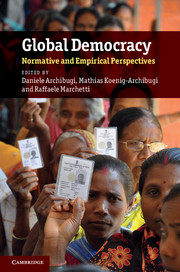Book contents
- Frontmatter
- Contents
- Figures
- Tables
- Notes on contributors
- Acknowledgements
- 1 Introduction
- 2 Models of global democracy
- 3 Citizens or stakeholders?
- 4 Is democratic legitimacy possible for international institutions?
- 5 Cosmopolitan democracy
- 6 Regional versus global democracy
- 7 Towards the metamorphosis of the United Nations
- 8 Flexible government for a globalized world
- 9 Global democracy and domestic analogies
- 10 Global democracy for a partially joined-up world
- 11 Civil society and global democracy
- 12 Global capitalism and global democracy
- 13 From peace between democracies to global democracy
- 14 The promise and perils of global democracy
- Index
- References
12 - Global capitalism and global democracy
Subverting the other?
Published online by Cambridge University Press: 05 June 2012
- Frontmatter
- Contents
- Figures
- Tables
- Notes on contributors
- Acknowledgements
- 1 Introduction
- 2 Models of global democracy
- 3 Citizens or stakeholders?
- 4 Is democratic legitimacy possible for international institutions?
- 5 Cosmopolitan democracy
- 6 Regional versus global democracy
- 7 Towards the metamorphosis of the United Nations
- 8 Flexible government for a globalized world
- 9 Global democracy and domestic analogies
- 10 Global democracy for a partially joined-up world
- 11 Civil society and global democracy
- 12 Global capitalism and global democracy
- 13 From peace between democracies to global democracy
- 14 The promise and perils of global democracy
- Index
- References
Summary
The setting: liberal versus insurgent cosmopolitanism
Marxists have long argued that bourgeois democracy is the best political shell for capitalism. The question it raises is whether an embryonic form of bourgeois democracy at the global level is more likely to facilitate global capitalism. The fact that capitalism and imperialism have historically proceeded hand in hand would suggest that the creation of institutional mechanisms that take the global democracy project forward is either not possible or will assume a shape and content that only goes to legitimize imperialist globalization. The experience of the intricate and stable European Parliament (EP) shows that democracy beyond the nation-state, even if rooted in the relatively high cohesion of common values of European Union (EU) states, has a minimal welfare-bearing impact on the lives of ordinary citizens. More to the point, the creation of an EP has not transformed the external relations of Europe – that is, its approach towards the developing world; this relationship is still best defined in the language of exploitation and domination. Its consequences are manifested within the EU in the lack of a cosmopolitan outlook towards asylum seekers and migrant populations from the poor world. A principal reason for these outcomes is that the political aggregation in Europe has taken place under the guidance and influence of a transnational capitalist class (TCC) that is less concerned with configuring it for the benefit of peoples in the developing world and more towards enhancing its global influence and profits (Bourdieu 2002, Appeldoorn 2003, Stevenson 2007, Manners 2007). To put it differently, bourgeois democracy in the imperial world has always tolerated exploitation and domination abroad and inhospitality to aliens within.
It can yet be argued that the creation of bourgeois democratic institutional forms on EU lines (e.g., a global people's assembly) with all its limitations will represent a step forward as the voices of the transnational oppressed classes (TOC) will have a better chance of being heard and influencing global policy making (Falk and Strauss 2001, Marchetti and Murithi, both this volume). The value of the accompanying idea of reducing democracy deficit in key international institutions (such as the International Monetary Fund [IMF], World Bank and World Trade Organization [WTO]) should also not be underestimated. This has been the demand of subaltern states and groups for a long time and was initially embodied in the idea of establishing a new international economic order and more generally in the long-held demand for the democratization of international relations and institutions. It is also the goal of many initiatives coming from the ‘global civil society’ today, as can be seen from the claims emerging from the World Social Forum (WSF). To put it differently, the fact that a fragmented global state constituted by proliferating and powerful international institutions is already in the process of emerging makes its democratization an unavoidable practical task (Chimni 2004).
- Type
- Chapter
- Information
- Global DemocracyNormative and Empirical Perspectives, pp. 233 - 253Publisher: Cambridge University PressPrint publication year: 2011



